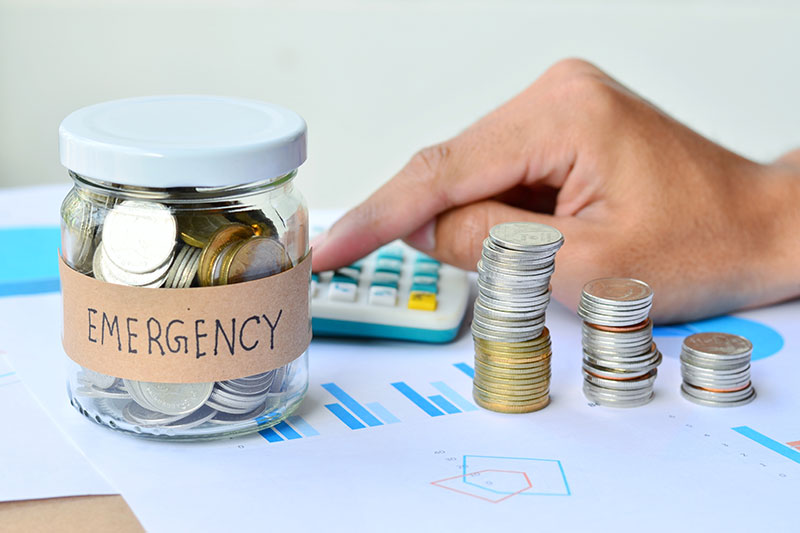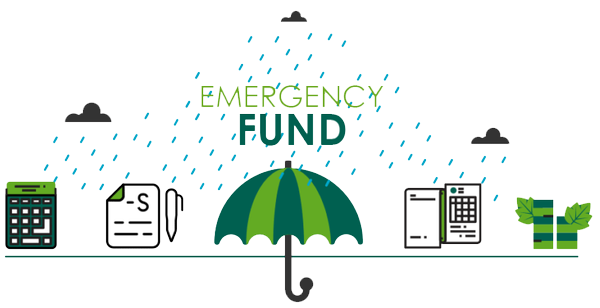Emergency Funds: Your Financial Lifeline in Times of Crisis

Emergency Funds: Your Financial Lifeline in Times of Crisis

With the unstable, fast-paced world in which we live, emergency funds are no longer a luxury but a necessity. It might be an unexpected layoff, a medical emergency, or a car breakdown – a financial cushion can reverse the situation from adversity to financial disaster. This is a step-by-step presentation and will address everything you need to know on emergency funds. what they are, why they’re so crucial, how to build one, and how to use them effectively.
What Is an Emergency Fund?
An emergency fund is a stash of money set aside specifically for unforeseen bills. It’s not for vacations, shopping excursions, or even regular bills. Instead, it is a buffer of money that can keep you from going into debt when the unexpected occurs.
Key Characteristics of Emergency Funds
• Accessible: Easily reachable and stored in a regular or high-interest savings account for quick use during emergencies.
• Purpose-specific: Used only for real emergencies.
• Secure: Not invested in the stock market.
• Non-negotiable: Must not be spent unless it’s a genuine emergency.
• Peace of mind: Prevents anxiety over unexpected financial shocks.
Why Emergency Funds Are Important
Emergencies don’t come with a warning they appear without notice and demand immediate action. Below are some situations under which emergency funds are crucial:
1. Loss of a job
• An emergency fund offers financial security in between employments.
• It pays for the barest necessities such as rent, bills, and food.
• It avails you with a sense of confidence to hunt for the ideal job at a non-pressing pace.
2. Medical Emergencies
• Issues related to health might occur suddenly and encompass huge expenses.
• Emergency funds minimize the use of high-interest loans.
• They ensure individuals can receive medical care without delays caused by financial constraints.
3. Major Repairs
• Homes and vehicles can malfunction at any moment.
• They prevent interruptions to regular life.
4. Family or Personal Crisis
• Emergencies of loved ones could be emotionally and financially draining.
• Emergency funds enable you to travel or assist without stress.
• They ease the burden in challenging times.
How Much Do You Save in Your Emergency Fund?
There isn’t a universal rule for everyone, but the following suggestions can help you determine what works best for your situation.

Recommended Amounts for Emergency Funds:
• Single with Regular Income: 3-6 months of necessary expenses.
• For individuals who are married and supporting dependents, it’s wise to set aside enough to cover 6 to 12 months of essential household expenses to safeguard against unexpected financial disruptions.
• Self-Employed or Freelancers: Work towards at least 12 months.
Formula for Calculating Emergency Funds:
Monthly Necessary Expenses × Number of Backup Months = Ideal Emergency Fund
Necessary Expenses?
• Home or mortgage rent.
• Monthly utility bills (electricity, water, gas).
• Daily necessities and food.
• Insurance premiums (life, vehicle, health).
• Most basic debt or loan payment.
• Transportation expenses.
• School or tuition charges if applicable.
Where to Store Your Emergency Fund
The location of your emergency funds is just as important as having one. Your money should be safe, accessible, and ideally earning some interest.
Best Places to Park Your Emergency Fund
• High-Yield Savings Account: Offers liquidity and better interest than regular savings.
• Money Market Accounts : offer a smart blend of competitive interest rates and quick access to your funds, making them ideal for emergency savings
• Short-Term Fixed Deposits: Slightly higher interest; check for no withdrawal penalty.
• Digital Banks: Some offer instant access and facilities to manage your fund.
• Neobanks: Have some in-built goal and emergency savings features.
Avoid These Locations
• Stock Market: Too risky and volatile for emergencies.
• Long-Term Investments: Liquid limitations and may have charges.
• Cash at Home: Susceptible to theft, fire, or loss.
Steps to Create Your Emergency Fund

1. Define a Specific Goal
• Choose how much you need depending on your lifestyle.
• Break your savings target into smaller, achievable steps to stay encouraged and track your progress more easily.
• Redefine the amount annually because your needs keep changing.
2. Automate Your Savings
• logicall assign regular transfers from your salary account.
• Schedule your savings to automatically transfer on payday, making it your top financial priority before any other expenses.
• leverage banking functionalities to round up purchases to save automatically.
3. Avoid Extraneous Spending
• Reduce unnecessary spending.
• Cut back on frequent takeout meals, cancel unused subscriptions, and think twice before making spontaneous purchases.
• direct these savings into your emergency fund.
4. Save Windfalls
• Windfalls due to bonuses, tax refunds, or gifts can accelerate savings.
• At least 50% of windfalls place in your emergency fund.
• Use windfalls as treats to enhance security.
5. Track Progress
• Utilize spreadsheets or mobile applications to track.
• Set monthly or quarterly checks.
• Reward milestones to stay motivated.
When and How to Draw Down Your Emergency Fund
Sound Reasons to Draw Down Emergency Funds
• Unexpected loss of a job: Fund necessary cost of living.
• Medical emergency: Fund immediate treatment or surgery.
• Emergency repairs: Car or home breakdown.
• Unexpected legal expenses: E.g., emergencies or accidents.
How to Draw Down Sensibly
• Determine the urgency of the expense.
• Draw down only what is required.
• Keep a record of the drawdown.
• Establish a time period to refill the fund.
Mistakes to Avoid with Emergency Funds
1. Using It on Non-Emergencies
• Not every inconvenience is an emergency.
• Use vacation or shopping money in other funds.
2. Investing Your Emergency Fund
• Don’t invest in stocks, mutual funds, or risky investments.
• Maintain the fund liquid and secure.
• Sacrificing returns in terms thereof is not valued.
3. Not Rebuilding When Used
• Rebuild the amount as soon as possible.
• Rebuild the fund earlier.
4. Maintaining It at Home in Cash
• Risk of theft or natural disaster.
• Interest not accrued.
• Not traceable or manageable easily.
Rainy Day Fund vs Emergency Fund
• Emergency Funds: Savings for life-changing events.
• Rainy Day Funds: For small, unexpected spending.
• Maintain both funds separately for convenience and discipline.
Retirement Fund vs Emergency Fund
• Temporary, emergency withdrawal for emergency funds.
• Permanent long-term investment in retirement age for retirement funds.
• Earlier withdrawal of retirement savings will be subject to penalty.
Various Life Phases of Emergency Funds
Students
• Save Rs.5,000 to Rs.10,000 for minor emergencies.
• Keep it in an e-wallet or bank account.
• Avoid missing an early habit of savings.
Young Professionals
• Save 3 months’ of living expenses.
• Save increasingly as income goes up.
• Use automation to build a habit.
Families
• Aiming for 6–12 months’ of combined expenses.
• Meet the children’s expenses and insurance loopholes.
• Re-evaluate fund size upon major life changes.
Retirees
• Individuals must have a liquid fund to cover 1 year of expenditure.
• Caution the children against investing when markets fall. • make allowance for medical crises and higher healthcare costs.
Management Tools
Apps
• YNAB: Special emergency category may be created.
• PocketGuard: Tracks where money spent and where spent.
• Goodbudget: Envelope budgets online.
Accounts
• Special accounts which can auto-sweep.
• Maintenance-free accounts accessible.
• Look at which apps include savings goals and data.

Mental Health Benefits of Emergency Funds
Funds are not just a financial preparedness issue; they include mental health considerations too.
Peace of Mind
• Less money stress in uncertain times.
• Gives a sense of security and mastery.
• Better sleep and better decision making.
Better Decision Making
• Free yourself from desperation choices.
• Lets you plan ahead with no fear.
• Allows thoughtful, confident action.
Improved Relationships
• Worried about money usually brings in fight.
• Emergency funds make pressure off partners.
• Supports shared goals and partnership.
Establishing Emergency Funds on Low Resources
Even on low resources, you can start small and work up.
Methods
• Save small change or change a day.
• Save a portion of each paycheck.
• Start a side hustle or freelance work.
• Track spending with budgeting apps.
• Sell junk for quick saving boosts.
• Turn to employers for help or financial literacy initiatives.
Each rupee matters when you’re growing your emergency savings.
Frequently Asked Questions (FAQs)
Should I accumulate an emergency fund?
• Start early, even if it’s only a little bit.
• Be consistent rather than big.
• Establish sensible monthly objectives.
Do I put my emergency fund into investments?
• Never. Hold it in a liquid, low-risk instrument.
• Investments are volatile and not appropriate for emergencies.
Can I use my credit card as a substitute for an emergency fund?
• Do not use credit cards.
• Interest leads you into debt traps.
• Emergency funds are safer and less costly.
If I never do have an emergency?
• That’s a success! Your money continues to accrue slowly.
• The fund is your safety net and lessens financial pressure.

Conclusion: Your Safety Net Starts Now
Your path to financial security begins with the very first rupee you save. You might be just starting out, or you could be refining your existing plan. Whatever your position, emergency funds are an anchor for a more secure, confident future.
Final Tips:
• Start small but start today.
• Automate your savings.
• Make it separate from regular spending.
• Re-assess and grow the fund over time.
• Use it only for genuine emergencies. Begin small, be consistent, and remember — it’s not about how much you save, but how often you save it.
For a comprehensive approach to financial preparedness, explore our smart financial planning strategies. Additionally, the Consumer Financial Protection Bureau’s guide offers valuable insights on building an emergency fund.






